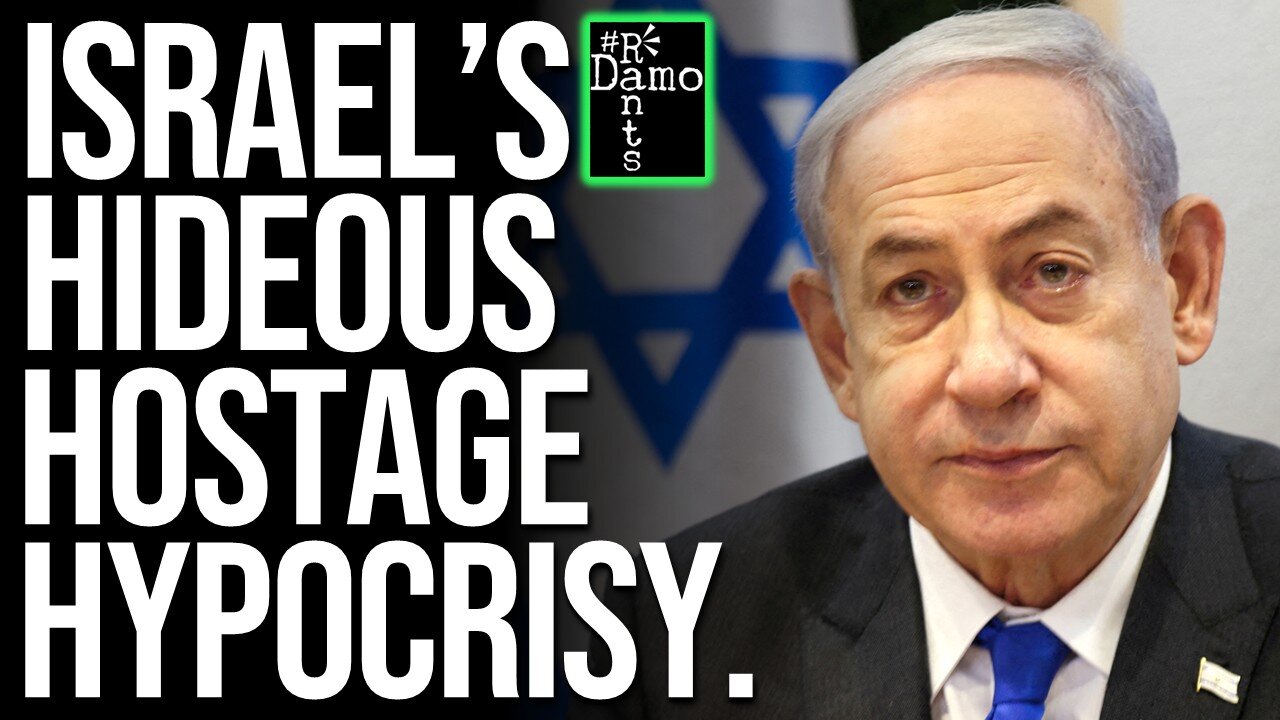Premium Only Content

The Prison Leak Israel Feared – And It’s Blown Wide Open!
Right, so as Israel continues to wage its ongoing military campaign in Gaza, much has been made in global media, especially in the West about the plight of Israeli hostages held by Hamas. It is supposedly the whole reason Israel went into Gaza after October 7th after all, so this campaign is emotive and well-publicised in mainstream outlets, even if Israel largely seem to have forgotten about them and where some far right ministers want them to be reconsidered as prisoners, so they can be left after Israel’s true aims are achieved, the end of Hamas and the end of Gaza as Israel now seeks to seize the strip entirely. Yet behind this calculated display of victimhood lies a reality far less defensible: the conditions inside Israel’s own prisons, where Palestinian hostages—when many are detained without charge, they are not prisoners after all—are subjected to treatment that increasingly fits the legal definition of torture, especially in light of recent reports of what Israel are alleged to be intentionally doing there.
This contradiction between those held by one side versus the other is not a matter of optics or hypocrisy alone. It reveals the settler-colonial logic that structures the Israeli carceral regime. While invoking international law to safeguard its own, Israel brazenly violates those very norms when it comes to Palestinians. The prison becomes a microcosm of apartheid: a space where the racialised body is degraded, where disease is not prevented but deliberately being spread, and where medical care is not a right but a tool of punishment being withheld. Israel’s prison system is not simply failing its humanitarian obligations—it is actively weaponising disease and medical neglect and it’s a story that has gone widely ignored.
Right, so recent reports from several Palestinian rights organisations, corroborated by some regional media and international observers, have documented a pattern of biological abuse happening within Israel’s prison system. At the end of last month, Press TV and the Palestine Information Center reported that the Israel Prison Service (IPS) was deliberately infecting Palestinian detainees with contagious diseases, most notably scabies, and subsequently denying them treatment. The Palestinian Commission of Detainees’ and Ex-Detainees’ Affairs described a calculated process by which detainees were placed in filthy cells, forced to sleep on contaminated mattresses previously used by visibly ill inmates, and refused access to medical personnel or basic hygiene supplies.
One of the documented cases involves Hassan Imad Abu Hassan, who was infected with scabies after being forced to sleep in unsanitary conditions. His infection remained untreated for over three months, during which time his condition deteriorated. Another detainee, Alaa Al-Adham, developed severe skin inflammations and allergic reactions, which were ignored by prison staff despite visible signs of distress. A third prisoner, Bilal Amr, previously injured and fitted with platinum rods in his back, was subjected to chronic pain and vision loss and denied any access to specialists. All three cases demonstrate a systematic policy of medical neglect, rather than administrative failure.
This pattern is consistent with earlier alarms raised back in March by the Palestinian Prisoner Society, which warned of a "health disaster" unfolding in Megiddo Prison. Reports indicated the mass spread of scabies again, compounded by the denial of hygiene products and treatment. But the most damning allegation came from the Palestinian Prisoners Club back in April, which reported that Israeli prison authorities were intentionally transferring infected prisoners between facilities in order to propagate disease. The deliberate relocation of detainees from Megiddo to Negev Prison, without sanitation or screening, created secondary outbreaks in otherwise uninfected areas. These actions—documented by the Middle East Monitor—constitute not only negligence, but a targeted use of illness as a tool of collective punishment.
The systematic nature of these abuses—documented across multiple prisons and corroborated by independent organisations—makes clear that this is not merely the result of underfunding or individual misconduct. Rather, it reflects an institutional strategy in which the health of Palestinian detainees is rendered expendable, and disease itself becomes a mode of disciplinary control.
The legal frameworks governing the treatment of prisoners—particularly those in occupied territory or under conditions of armed conflict—are clear and unambiguous though. The Fourth Geneva Convention mandates humane treatment of all detainees, including access to adequate food, medical care, and sanitary conditions. Article 27 prohibits any measures that cause "physical suffering," while Article 32 explicitly outlaws acts that might lead to the "extermination" of detainees, whether through direct violence or by imposing unliveable conditions. The prohibition of collective punishment in Article 33 further precludes punitive transfers and group exposure to disease, so this under reported story is racking up some serious potential additional charges to add to the ever growing Israeli rap sheet.
Under the International Covenant on Civil and Political Rights (ICCPR), to which Israel is a party, Article 7 bans "torture or cruel, inhuman or degrading treatment," and Article 10 affirms the right of detainees to be treated with dignity. These rights are non-derogable, meaning they cannot be suspended even in times of war. Israel’s practices, if the above allegations are accurate, and given where they are coming from, and Israel’s conduct already, why wouldn’t they be? Constitute clear breaches of these provisions.
The Rome Statute of the International Criminal Court expands on these protections by recognising the denial of medical care as both a war crime and a crime against humanity when committed systematically. Article 7 of the Statute includes "inhumane acts" intentionally causing great suffering, while Article 8 addresses the wilful causing of serious injury or health deterioration among detainees. Israel, though not a signatory to the Rome Statute, is subject to ICC jurisdiction with respect to crimes committed in Palestinian territory, given Palestine’s 2015 accession to the Court.
Moreover, the Convention Against Torture, also binding on Israel, defines torture to include acts of omission, where suffering is inflicted through deliberate neglect, and not only through physical violence. If medical treatment is withheld as a means of punishment or coercion, it meets the threshold for torture under international law. These provisions leave little room for legal ambiguity. What is alleged in Israel’s prisons is not a breach of best practices or humanitarian ethics—it is a set of prosecutable offences under the most serious legal instruments of our time. All the more unforgivable then that Israel deliberately infecting their Palestinian detainees is going grossly unreported then.
These recent developments are not unprecedented. They fit within a broader pattern of medical neglect and biological degradation that has long defined Israel’s treatment of Palestinian prisoners. One emblematic case is that of Walid Daqqah, a Palestinian intellectual and long-term political prisoner, who died in April 2024 after being denied a potentially life-saving bone marrow transplant. Despite repeated appeals from international medical and human rights organisations, Daqqah was left to deteriorate in solitary confinement. Amnesty International described his treatment as "cruel, inhuman, and degrading" and demanded his immediate release for palliative care—a demand Israel refused.
Similarly, in April 2025, 17-year-old Walid Ahmad died in Israeli custody after being held for six months without charge. The Guardian reported that he had exhibited signs of amoebic dysentery and severe skin infections. Despite multiple medical complaints, he received no meaningful treatment. His death sparked outrage across Palestinian society, particularly because his case mirrored so many others—arbitrary detention, medical neglect, and death in isolation.
These cases reflect what scholars have increasingly termed "medical apartheid"—a regime in which the availability and quality of healthcare is structured by race and political status. Palestinians in Israeli prisons do not merely receive substandard care. Their access to medical resources is conditional on compliance, confession, or simply withheld as a form of pressure and degradation. This is not a failure of the healthcare system—it is the system functioning precisely as designed.
Perhaps the most jarring element of this entire regime is the profound moral hypocrisy it exposes. As Israel broadcasts images of its hostages in Gaza and pleads for international solidarity, it simultaneously subjects Palestinian detainees—including children, activists, and even non-violent protestors—to practices that would be widely denounced as war crimes if enacted by any other state.
This contradiction has not gone unnoticed. In recent months, several Israeli hostage families have broken with the government’s narrative, accusing Benjamin Netanyahu of prolonging the war at the cost of both hostages and Palestinian lives. Their criticism is pointed: a state that claims to care about its citizens in captivity cannot credibly ignore or conceal the suffering it inflicts upon others. It is a moral failure, but also a strategic one—eroding Israel’s credibility in international legal forums such as the International Court of Justice, where it now faces those plausible accusations of genocide.
At its heart, this is not a narrative failure but a regime of racialised valuation. Hostages are Jewish, citizens, human. Prisoners are Palestinian, stateless, disposable. This is why people argue so much over terminology. The legal frameworks invoked on behalf of one group are denied to the other. This selective humanism is not only legally untenable—it is ethically unsustainable.
The use of disease and denial of healthcare as instruments of repression has long historical precedent. In apartheid South Africa, the death of Steve Biko after being denied medical care while suffering internal injuries shocked the world and became a turning point in the international movement against the regime. In US black sites and Guantanamo, detainees were denied medical care unless they cooperated with interrogators, a practice widely condemned as torture by human rights organisations.
In Myanmar’s Rakhine State, the Rohingya population has been confined to internment camps where medical care is systematically denied, and preventable diseases run rampant. The parallels to Israel’s prisons are not only clear—they are damning. In each case, we find a racialised population subjected to structural violence, and in each case, disease becomes the medium through which power is expressed.
Israel’s prison policies are now under increasing scrutiny from the international legal community at least though. The ICJ’s interim ruling in 2024 that Israel’s actions in Gaza could plausibly amount to genocide opens the door for broader evidentiary submissions, including those documenting prison abuses. The ICC, already investigating crimes in the Occupied Palestinian Territories, may be compelled to consider the conduct of prison officials, IPS medical staff, and policymakers.
Beyond formal institutions, civil society has stepped into the vacuum left by diplomatic cowardice. Palestinian families, advocacy organisations, and international solidarity groups are launching legal cases under universal jurisdiction statutes in Europe. New BDS campaigns are targeting medical suppliers and pharmaceutical firms complicit in the prison regime. International health bodies are calling for Israel’s suspension from global forums until it complies with its obligations under international law.
Israel’s treatment of detainees is not a deviation from the norm. It is the norm. The use of disease, degradation, and medical neglect as tools of repression is not a policy failure—it is a function of apartheid. As Israel demands the return of hostages, it must reckon with the hostages it has created in its own cells. A state that tortures its prisoners cannot claim the mantle of moral victimhood. A regime that weaponises disease cannot invoke the Geneva Conventions in good faith. And a society that tolerates such cruelty cannot claim to stand for democracy.
The carceral system reveals the truth of the state. And in Israel’s case, that truth is contagious.
As for Israel’s prisoners, one of Netanyahu’s hard right ministers has said the quiet part out loud and that their hostages, the very reason for going into Gaza as they have been, should now be reclassified as prisoners, because by doing that, Israel can just ignore them until Hamas is defeated – this is why terminology is important, so get all the details of that story in this video recommendation here as your suggested next watch.
Please do also hit like, share and subscribe if you haven’t done so already so as to ensure you don’t miss out on all new daily content as well as spreading the word and helping to support the channel at the same time which is very much appreciated, holding power to account for ordinary working class people and I will hopefully catch you on the next vid. Cheers folks.
-
 LIVE
LIVE
blackfox87
13 hours ago🟢 SUBATHON DAY 1 | BO7 BETA | Premium Creator | #DisabledVeteran
5,636 watching -
 2:24:09
2:24:09
The Quartering
3 hours agoCandace Owens WAR With TPUSA, Antifa BLOWN N OUT, & Pathetic Demand For Trump Interview
96.7K40 -
 LIVE
LIVE
Alex Zedra
3 hours agoLIVE! Playing BO7 Beta!
998 watching -
 1:52:56
1:52:56
TimcastIRL
4 hours agoElon Musk Says Woke NGO Responsible For Charlie Kirk Assassination | Timcast IRL
133K112 -
 1:26:12
1:26:12
Steven Crowder
15 hours agoThe Left is Violent (Part 2) | Change My Mind
518K836 -
 1:23:53
1:23:53
Man in America
8 hours agoDollar Collapse is Engineered to Herd Us Into CBDC Prison—David Jensen EXPOSES the Playbook
37.2K10 -
 5:16:01
5:16:01
MattMorseTV
7 hours ago $7.26 earned🔴CHILLING + TALKING🔴
87.1K3 -
 2:04:23
2:04:23
The Charlie Kirk Show
5 hours agoTHOUGHTCRIME Ep. 99 — THOUGHTCRIME IRL
109K38 -
 1:11:34
1:11:34
Flyover Conservatives
12 hours agoSilver Shortage ALERT: London Vaults Running Dry in 4 Months- Dr. Kirk Elliott; 3 Tips to Transform Your Business - Clay Clark | FOC Show
34.2K3 -
 1:10:18
1:10:18
Glenn Greenwald
7 hours agoIsrael Pays Influencers $7,000 Per Post in Desperate Propaganda Push: With Journalist Nick Cleveland-Stout; How to "Drink Your Way Sober" With Author Katie Herzog | SYSTEM UPDATE #525
112K116
